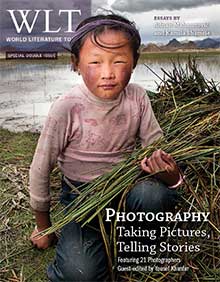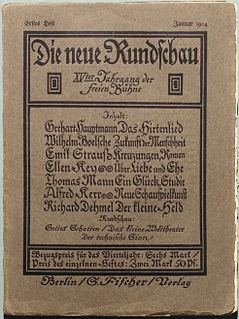Alfred Hellmuth Andersch was a German writer, publisher, and radio editor. The son of a conservative East Prussian army officer, he was born in Munich, Germany and died in Berzona, Ticino, Switzerland. Martin Andersch, his brother, was also a writer.
Although Irish has been used as a literary language for more than 1,500 years, and modern literature in Irish dates – as in most European languages – to the 16th century, modern Irish literature owes much of its popularity to the 19th century Gaelic Revival cultural movement. Writers in Irish have since produced some of the most interesting literature to come out of Ireland, supplemented by work produced in the language abroad.

Yōko Tawada is a Japanese writer currently living in Berlin, Germany. She writes in both Japanese and German. Tawada has won numerous literary awards, including the Akutagawa Prize, the Tanizaki Prize, the Noma Literary Prize, the Izumi Kyōka Prize for Literature, the Gunzo Prize for New Writers, the Goethe Medal, the Kleist Prize, and a National Book Award.

Cornish literature refers to written works in the Cornish language. The earliest surviving texts are in verse and date from the 14th century. There are virtually none from the 18th and 19th centuries but writing in revived forms of Cornish began in the early 20th century.
Austrian literature is the literature written in Austria, which is mostly, but not exclusively, written in the German language. Some scholars speak about Austrian literature in a strict sense from the year 1806 on when Francis II disbanded the Holy Roman Empire and established the Austrian Empire. A more liberal definition incorporates all the literary works written on the territory of today's and historical Austria, especially when it comes to authors who wrote in German. Thus, the seven volume history of Austrian literature by the editors Herbert Zeman and Fritz Peter Knapp is titled Geschichte der Literatur in Österreich. The Austrian literature must be considered in close connection with German literature in general, and the borderline between proper German literature and the Austrian one is porous, due to rich and complex cultural exchanges.
A feuilleton was originally a kind of supplement attached to the political portion of French newspapers, consisting chiefly of non-political news and gossip, literature and art criticism, a chronicle of the latest fashions, and epigrams, charades and other literary trifles. The term feuilleton was invented by the editors of the French Journal des débats; Julien Louis Geoffroy and Bertin the Elder, in 1800. The feuilleton has been described as a "talk of the town", and a contemporary English-language example of the form is the "Talk of the Town" section of The New Yorker.

Dimitris Lyacos is a contemporary Greek poet and playwright. He is the author of the Poena Damni trilogy. Lyacos's work is characterised by its genre-defying form and the avant-garde combination of themes from literary tradition with elements from ritual, religion, philosophy and anthropology. The trilogy interchanges prose, drama and poetry in a fractured narrative that reflects some of the principal motifs of the Western Canon. Despite its length - the overall text counts no more than two hundred pages - the work took over a period of thirty years to complete, with the individual books revised and republished in different editions during this period and arranged around a cluster of concepts including the scapegoat, the quest, the return of the dead, redemption, physical suffering, mental illness. Lyacos’s characters are always at a distance from society as such, fugitives, like the narrator of Z213: Exit, outcasts in a dystopian hinterland like the characters in With the People from the Bridge, or marooned, like the protagonist of The First Death whose struggle for survival unfolds on a desert-like island. Poena Damni has been construed as an "allegory of unhappiness" together with works of authors such as Gabriel Garcia Marquez and Thomas Pynchon and has been acknowledged as an exponent of the postmodern sublime as well as one of the notable anti-utopian works of the 21st century.
Sudanese literature refers to both oral as well as written works of fiction and nonfiction that were created during the cultural history of today's Republic of the Sudan. This includes the territory of what was once Anglo-Egyptian Sudan, as well as this area's long and diverse history.

World Literature Today is an American magazine of international literature and culture, published at the University of Oklahoma, Norman. The magazine presents essays, poetry, fiction, interviews, and book reviews from all over the world in a format accessible to a broad audience. Its mission is to serve as an engaging, informative index to contemporary international literature. It was founded as Books Abroad in 1927 by Roy Temple House, chair of the Department of Modern Languages at the University of Oklahoma. In January 1977, the journal assumed its present name, World Literature Today.

Mohammed Bennis in Arabic محمد بنيس is a Moroccan poet and one of the most prominent writers of modern Arabic poetry. Since the 1970s, he has enjoyed a particular status within Arab culture. Muhsin J al-Musawi states that "Bennis’ articulations tend to validate his poetry in the first place, to encapsulate the overlapping and contestation of genres in a dialectic, that takes into account power politics whose tropes are special. As a discursive threshold between Arab East and the Moroccan West, tradition and modernity, and also a site of contestation and configuration, Muhammad Bennis' self-justifications may reveal another poetic predilection, too."
Shahriar Mandanipour (Persian: شهریار مندنی پور; also Shahriar Mondanipour , Shiraz, Iran, is an Iranian writer, journalist and literary theorist.
Planodion is a Greek literary periodical published by the poet Yiannis Patilis since 1986.
The Austrian literary magazine Literatur und Kritik was founded in April 1966 by the Austrian writers Rudolf Henz, Gerhard Fritsch, and Paul Kruntorad as successor of the literary publication Wort in der Zeit, which had existed since 1955.

Irish Pages: A Journal of Contemporary Writing is a literary magazine published in Belfast and edited by Chris Agee and Cathal Ó Searcaigh. It was launched in 2002 and appears biannually.
Theo Breuer is a German poet, essayist, editor, translator and publisher.
Joseph Pivato is a Canadian writer and academic who first established the critical recognition of Italian-Canadian literature and changed perceptions of Canadian writing. From 1977 to 2015 he was professor of Comparative Literature at Athabasca University, Canada.

The Neue Rundschau, formerly Die neue Rundschau, founded in 1890, is a quarterly German literary magazine that appears in the S. Fischer Verlag. With its over 100 years of continuous history, it is one of the oldest cultural publications in Europe.
Thomas E. Kennedy is an American fiction writer, essayist, and translator from Danish. He is the author of more than 30 books, including novels, story and essay collections, literary criticism, translation, and most notably the four novels of the Copenhagen Quartet. Of the quartet, David Applefield, author of Paris Inside Out and The Unofficial Guide to Paris series of books, writes: “Kennedy does for Copenhagen what Joyce did for Dublin.”
Exophony is the practice of writing in a language that is not one's mother tongue. While the phenomenon has been known for ages, the term is relatively new: it was introduced within the field of literary and cultural studies by Susan Arndt, Dirk Naguschewski and Robert Stockhammer in 2007.
Martin Horváth is an Austrian writer and musician currently living in Vienna.






